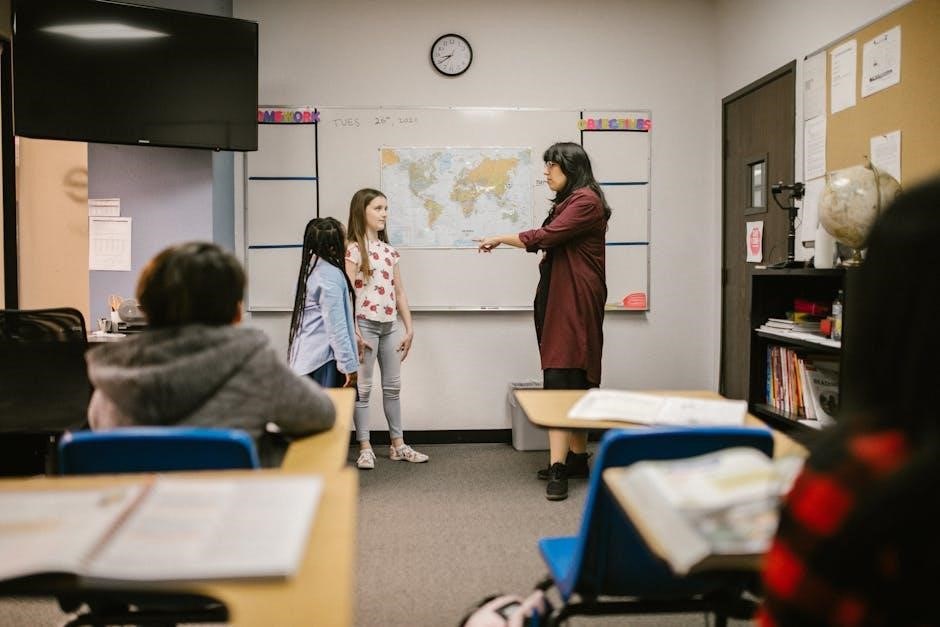Lesson plans for infants aged 12-18 months focus on exploration, discovery, and holistic development. They incorporate cognitive, social-emotional, and motor skill activities, ensuring engaging and tailored experiences for young learners.
Overview of Infant Development
Infants aged 12-18 months experience rapid growth across cognitive, social-emotional, and motor domains. Cognitively, they explore cause-and-effect relationships and object permanence, laying the foundation for problem-solving. Social-emotionally, they build attachments and trust, beginning to understand their interactions with others. Motor skills advance, with improvements in crawling, walking, and fine motor abilities. Language development blossoms, with babbling evolving into simple words. Sensory exploration becomes a cornerstone of learning, as infants engage with textures, sounds, and sights. This period is crucial for creating a nurturing environment that fosters curiosity and supports their natural inclination to discover and learn.
Importance of Lesson Plans for This Age Group
Lesson plans for infants aged 12-18 months are crucial for guiding their rapid development. They provide structured activities that support cognitive growth, social-emotional development, and motor skills. These plans help caregivers create a nurturing environment, ensuring infants meet developmental milestones. By incorporating sensory play, communication, and exploration, lesson plans foster curiosity and independence. Consistency in routines and activities is essential, as it helps infants feel secure and thrive. Tailored lesson plans also allow for adaptability, ensuring each child’s unique needs are met, promoting overall growth and development effectively.

Cognitive Development Activities
Engage infants with activities exploring cause-and-effect, object permanence, and early problem-solving. Sensory play, stacking toys, and shape sorting foster curiosity and foundational cognitive skills through play-based learning.
Exploring Cause-and-Effect Relationships
Cause-and-effect activities are essential for infants aged 12-18 months, fostering curiosity and understanding of how actions lead to outcomes. Simple games like shaking a rattle, dropping objects, or pressing buttons on interactive toys help infants grasp these relationships. Activities such as splashing water in a tub or watching bubbles float and pop encourage experimentation and discovery. These experiences strengthen cognitive development by teaching infants to predict and respond to events, laying the foundation for problem-solving and critical thinking skills. Incorporating these activities into lesson plans supports a child’s natural desire to explore and learn about their environment.
Object Permanence and Early Problem-Solving Skills
Activities fostering object permanence and early problem-solving skills are vital for infants aged 12-18 months. Hide-and-seek games with toys or peek-a-boo with caregivers help infants understand that objects continue to exist even when out of sight. Simple puzzles or retrieving hidden items encourage critical thinking and persistence. These exercises strengthen cognitive development by teaching infants to reason and locate objects, building foundational problem-solving abilities. Incorporating such activities into lesson plans supports infants in developing a sense of control and mastery over their environment, enhancing their curiosity and eagerness to explore and learn.
Social-Emotional Development
Social-emotional development for infants aged 12-18 months focuses on building trust, encouraging communication, and fostering healthy attachments. Activities promote emotional awareness and interpersonal connections, laying the groundwork for lifelong relationships and self-confidence.
Building Attachments and Trust
Building attachments and trust with infants aged 12-18 months is crucial for their emotional development. Caregivers can foster trust through responsive interactions, such as eye contact, gentle touch, and soothing voices. Consistent routines and positive reinforcement create a safe environment, helping infants develop secure attachments. Activities like reading, singing, and mirrored movements strengthen bonds and encourage emotional security. These practices lay the foundation for healthy relationships and resilience, supporting the infant’s ability to explore and learn confidently.
Encouraging Communication and Turn-Taking
Encouraging communication and turn-taking in infants aged 12-18 months involves interactive activities that foster language skills and social interaction. Name objects, encourage babbling, and engage in simple conversations. Reading books, singing songs, and using gestures stimulate verbal and non-verbal communication. Turn-taking games, like rolling a ball or exchanging toys, teach cooperation and reciprocity. These activities enhance bonding, promote emotional intelligence, and lay the groundwork for advanced language development. Incorporating music, rhymes, and responsive interactions further enriches these experiences, helping infants connect with others and express themselves effectively.

Motor Skill Development
Motor skill development for infants aged 12-18 months focuses on enhancing gross and fine motor abilities through play. Activities like touching body parts, exploring textures, and crayon play foster coordination and dexterity, promoting physical growth and independence.
Gross Motor Activities
Gross motor activities for infants aged 12-18 months focus on enhancing large muscle groups through movement and exploration. Activities like baby dance parties, crawling through tunnels, and climbing soft stairs encourage physical coordination and balance. Tummy time with toys or mirrors promotes strength and posture development. Outdoor play, such as walking in grass or exploring textures like sand, further stimulates motor skills. These activities not only build strength but also foster curiosity and independence, preparing infants for more complex movements like walking and running. Caregivers should ensure safe, open spaces for infants to explore and engage freely.
Fine Motor Skills Through Play
Fine motor skills in infants aged 12-18 months can be nurtured through play-based activities that encourage hand-eye coordination and dexterity. Activities like finger painting, stacking soft blocks, or transferring toys between containers are effective. Playdough exploration and tearing paper also enhance finger strength and precision. Providing crayons or chalk for scribbling fosters early writing skills. These activities not only build foundational motor abilities but also stimulate creativity and problem-solving. Caregivers should offer a variety of safe, age-appropriate materials to engage infants and promote their fine motor development through interactive and enjoyable play experiences.

Sensory Play and Exploration
Sensory play engages infants in exploring textures, sounds, and smells, fostering curiosity and brain development. Activities like touching textured balls, smelling fruits, or hearing paper crinkle stimulate their senses and encourage learning through interaction.
Age-Appropriate Sensory Activities
Sensory activities for infants aged 12-18 months should focus on safe, engaging experiences that stimulate their developing senses. Activities like touching textured fabrics, exploring sensory bins filled with soft beads or rice, or playing with water in a shallow container are ideal. Introducing different smells, such as lavender or vanilla, and sounds, like crinkling paper or music, also encourage exploration. These activities should be supervised to ensure safety and adapted to each infant’s preferences and developmental stage, fostering curiosity and promoting cognitive growth through hands-on experiences.
Linking Sensory Play to Cognitive Growth
Sensory play is a cornerstone of cognitive development for infants aged 12-18 months. By engaging their senses, infants begin to understand cause-and-effect relationships and develop problem-solving skills. Activities like exploring textured fabrics or sensory bins filled with beads or rice encourage curiosity and experimentation. These experiences enhance memory and hand-eye coordination, laying the foundation for future academic skills. Sensory play also fosters creativity and adaptability, as infants learn to navigate and interpret their environment. This type of play is essential for building a strong cognitive framework, preparing infants for more complex learning in the years to come.

Routines and Daily Schedules
Establishing consistent routines supports infants’ emotional and cognitive growth. A structured daily schedule with feeding, play, and sleep times promotes a predictable and nurturing environment.
Creating a Consistent Daily Schedule
Creating a consistent daily schedule for infants aged 12-18 months is essential for fostering a sense of security and routine. A well-structured schedule includes regular times for feeding, napping, and play, which helps infants develop a predictable rhythm. Activities should be balanced to promote physical, cognitive, and emotional growth. For example, mornings can start with sensory play, followed by music and movement, while afternoons might focus on outdoor exploration or quiet activities like reading. Consistency helps caregivers meet infants’ needs effectively and supports their overall development.
Adapting Routines to Individual Needs
Adapting routines to individual needs is crucial for infants aged 12-18 months, as each child develops at their own pace. Caregivers should observe and respond to unique preferences, such as feeding schedules, sleep patterns, and activity interests. For example, some infants may thrive with more sensory play, while others may need additional time for motor skill practice. Flexibility within a structured framework ensures that routines cater to diverse developmental stages and personalities, promoting a nurturing and inclusive environment. This approach fosters emotional security and supports each infant’s unique growth trajectory.

PDF Resources and Templates
Find free PDF lesson plan templates online, such as those from Teacher Planet, offering structured formats for infants aged 12-18 months. These templates include activities like art projects, sensory play, and motor skill exercises, tailored to early development.
How to Create a PDF Lesson Plan
To create a PDF lesson plan for infants aged 12-18 months, start by selecting a template that aligns with your curriculum goals. Websites like Teacher Planet offer free, customizable templates designed for this age group. Include sections for objectives, activities, materials, and assessment. Use simple, clear language and organize content visually with bullet points and images. Tools like Canva or Google Docs can help design the layout. Ensure the PDF is interactive by adding links to resources or videos. Finally, save and share the document in PDF format for easy access and printing, making it a practical tool for educators and caregivers.
Where to Find Free PDF Templates Online
Free PDF templates for infant lesson plans can be found on educational websites like Teacher Planet, Pinterest, and Google Drive. These platforms offer customizable templates tailored for infants aged 12-18 months, covering cognitive, social-emotional, and motor skill development. Search for keywords like “infant lesson plan templates PDF” or “younger toddler curriculum templates” to find suitable options. Many templates include sections for daily schedules, activity planning, and developmental goals. They are designed to be user-friendly, allowing educators to easily adapt them to meet individual needs and preferences.

Evaluating Lesson Plan Effectiveness
Evaluating lesson plan effectiveness involves assessing developmental progress, observing engagement, and gathering feedback from caregivers. Adjustments are made to ensure activities align with individual and group needs.
Assessing Developmental Progress
Assessing developmental progress in infants aged 12-18 months involves observing milestones like object permanence, problem-solving, and communication skills. Caregivers track improvements in cognitive, motor, and social-emotional domains through play-based activities. Regular documentation of achievements and challenges helps identify areas for support. Feedback from parents and educators ensures a comprehensive understanding of each child’s growth. This ongoing evaluation guides adjustments to lesson plans, fostering a nurturing environment that promotes individualized development and readiness for future learning experiences.
Adjusting Activities Based on Feedback
Feedback from parents, educators, and observations helps refine lesson plans for infants aged 12-18 months. By assessing engagement and progress, activities can be adapted to better suit individual needs. For example, if an infant shows fascination with sensory play, more textured materials can be introduced. Conversely, if certain tasks are challenging, simpler alternatives can be provided. This iterative process ensures activities remain engaging and developmentally appropriate, fostering growth and curiosity in a nurturing environment tailored to each child’s unique pace and interests.